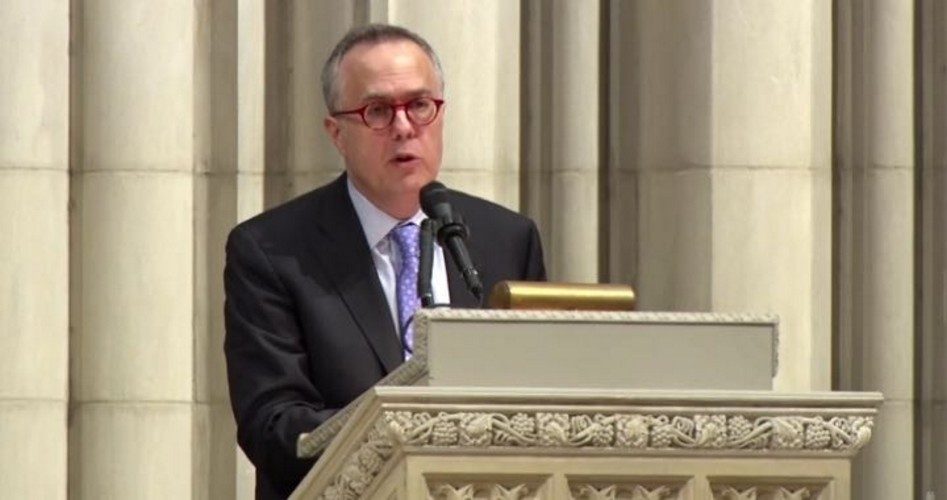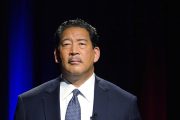
Michael Gerson is on the short list of supposed conservatives that the establishment loves — those who can be counted on to support the latest liberal cause, and then can be cited as a “conservative” by the mainstream liberal media.
Gerson is anything but a conservative, and his column this week, distributed by the Washington Post, is the latest proof of that. In the column, Gerson takes issue with the decision by Steve Mnuchin, secretary of the treasury for President Donald Trump to delay kicking President Andrew Jackson off the $20 bill, and replacing him with Harriet Tubman.
Whatever the merits of Tubman or Jackson, in his column, Gerson chose to compare Trump to President Warren Harding, by saying that Trump risks “being even more corrupt than Warren Harding and even less articulate than, well, Warren Harding.”
After the progressive political philosophy was repudiated in the 1920 presidential election, with Harding winning by an astounding seven million votes in a nearly 2-1 victory in the popular vote, the progressives made it their goal to destroy him. It is not surprising that a “neoconservative” such as Gerson would hate Harding — after all, what the neoconservatives have done is attempt to undermine true conservative principles by claiming that their liberal policies are instead the policies that conservatives should champion.
Back in the 1950s, Senator Barry Goldwater called the neoconservatives of his day the “Modern Republicans — imposter conservatives, who were simply replacing the limited government conservativism of stalwarts such as Senator Robert Taft with their “dime store New Deal.” In future years, they were the “Me Too” Republicans — people such as Governor Nelson Rockefeller of New York and Governor George Romney of Michigan (yep, father of Mitt) — who said they had no real differences with the Democrats on substance, but they could manage the Welfare State more efficiently.
Warren Harding was no neoconservative. Rather, he was an actual conservative, who denounced the progressive political philosophy in one concise sentence: “All human ills are not curable by legislation.” When Gerson smeared Harding as non-articulate, it was almost like saying Babe Ruth could not hit home runs. On the contrary, Harding was a professional wordsmith, a newspaper man back in the day when journalism was a craft. Harding’s speeches and writings were examples of the power of words. When President John Kennedy said, “Ask not what your country can do for you, but what you can do for your country,” he was basically plagiarizing remarks made by Harding.
When Harding became president in March 1921, he inherited a mess from President Woodrow Wilson, the progressive darling. The country had fallen into a very serious economic depression, and the national debt had grown from $1 billion to $24 billion. Inflation had eaten away at the value of the American dollar, resulting in a depreciation of at least 50 percent since Wilson had become president. The Gross Domestic Product had contracted by one-fourth, wages had fallen by 20 percent, and 100,000 businesses had closed their doors.
Instead of the activist government favored by the progressives (including a member of his own Cabinet, Secretary of Commerce Herbert Hoover), Harding said the best thing the government could do would be to let the free market correct the downturn. He allowed wages to fall to their natural level, and within a few short months, the depression was over. It was over so quickly, that it has been called, as James Grant called it in his book, The Forgotten Depression.
Harding specifically took issue with the push by Wilson for U.S. entry into the League of Nations, fearing that it would destroy America’s national independence. “The recorded progress of our Republic, materially and spiritually, in itself proves the wisdom of the inherited policy of noninvolvement in Old World affairs,” he said, adding, “We do not mean to be entangled.” He expressly cited the non-interventionist viewpoint of Founding Fathers such as George Washington and Thomas Jefferson. In fact, contrary to Gerson’s snarky remark that he was inarticulate, it was Harding who coined the term, “the Founding Fathers.”
This may partly explain the animus that Gerson holds for Harding. Neoconservatives such as Gerson advocate sending the American military around the world, involving our country in the affairs of the world.
Domestically, Harding got to work reducing tax rates and reducing the national debt. “There is not a menace in the world today like that of growing public indebtedness and mounting public expenditures,” Harding explained. “There has seemingly grown up an impression that the public treasuries are inexhaustible things.”
What about that corruption that Gerson attributed to Harding? The truth is that not one charge of corruption against Harding can be demonstrated. Out of all the appointments he made, there were a handful of men who violated the public trust — notably Secretary of the Interior Albert Fall, convicted in the Teapot Dome scandal, and Charles Forbes, director of the recently created Veterans’ Bureau, who took bribes (for which Harding fired him). But Harding was never implicated personally in any scandals — not one. The Teapot Dome scandal did not come to light until after Harding’s death from heart disease in 1923, or he probably would have fired Fall, too.
The probable genesis of the libel that Harding was both a horrible person and a horrible president is that his death in 1923 happened on the eve of the 1924 presidential election. Faced with a roaring economy, and Harding’s general success while in office, the Democrats desperately needed an issue, and the Teapot Dome Scandal provided that. Once the attacks began, they fed upon themselves. Despite the onslaught of attacks upon a defenseless dead man, the Democrats got very little electoral help from their vicious attacks upon Harding. Harding’s vice president, Calvin Coolidge, won a huge victory in the election the next year, almost completely untarnished by all the mud thrown on the memory of Warren Harding.
The Republican Party, determined to win the 1924 election, is at least partly to blame. In an effort to deflect attention away from their presidential candidate, Coolidge, and the rest of the Republican Party, Harding became the convenient scapegoat on whom to place the blame for any and all scandals. In other words, it was all Harding’s fault, but this Coolidge, why he is a “Puritan in Babylon.”
Sadly, we still see this occur today, as many unprincipled individuals are all too willing to “dump” on historical figures if that will keep the Left from attacking them.
Finally, if Gerson is looking for a real hero to talk about in the area of race relations, he need look no further than Warren Harding. Traveling to Birmingham, Alabama, President Harding urged the nation to move away from racial divisions in the country, calling on the states to respect the civil rights of all its residents, including black citizens. While Wilson — the progressive’s hero — had purged African-Americans from government jobs, Harding appointed more than 100 Black Americans to government positions in his administration.
Gerson is credited with creating the expression of “compassionate conservativism” during his time working for President George W. Bush, implying that normal conservatism is lacking in such. The moral arrogance of men such as Michael Gerson raises its ugly head whenever he opts to trash the memory of a true conservative — Warren Harding.
Image of Michael Gerson: Screenshot of YouTube video from the Washington National Cathedral
Steve Byas is the author of History’s Greatest Libels, in which he challenges the smears against several historical figures, such as Harding, Clarence Thomas, Christopher Columbus, Marie Antoinette, and Joseph McCarthy.


